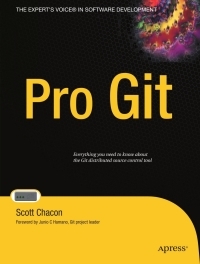You need to sign in or sign up before continuing.
Take a photo of a barcode or cover
funny
informative
lighthearted
slow-paced
Quite useful. Explained both basics and some more complex arcanes of git. I got an impression that in few places (ch. 4 for example) authors kind of limited their story, and constrained the information too much - but it was a good read anyway.
Oh, and you can read it online here:
http://progit.org/book/
Oh, and you can read it online here:
http://progit.org/book/
Some parts of the book were eye-opening for me. It's building a pyramid of knowledge, but it doesn't look like that until you reach the final chapter - Internals. Only after reading it I managed to connect all the dots.
I've been under-utilizing Git! So glad I got my hands on this book and it gave a deeper dive and it was written by Github's founder which makes it even more exciting and insightful to read from a dev's standpoint. There are some sections that I have no use for personally but they are nice to know that it exists as an option in case I need it in the future.
Copre l'uso di git dalle basi (clone, commit, push, pull, ecc.) agli internals, passando per la configurazione di vari tipi di server e degli hook, sia client-side che server-side, includendo anche una estesa trattazione delle best practice e di molti casi d'uso comuni sia in progetti piccoli che molto grandi. Non è molto chiaro sulle procedure di backup, e parla un po' troppo dell'uso di github trascurando di approfondire meglio la configurazione di un proprio server, ma non sono difetti sufficienti a fargli perdere una stellina dal voto. Da tenere anche sottomano come reference per cercare velocemente i comandi per ogni situazione.
I am now totally convinced that those people that rave about git and complain bitterly about 'traditional' version control systems are absolutely right. Git is a revolution! Not a new one but one I'm just coming to grips with.
I decided to read this whole book even though I'm just a newbie just so I had an idea of the breadth of topics and different features. I'll be sticking with basic usage but I can go back and reference the advanced topics later. I did skim read some of those topics, no need to read advanced scripts when I won't be using those.
The main take out for me for the advantages of git are:
- ability to save all your work in a logical manner (in topic branches) before you do any commit. There is no good solution to this in the tools I'm used to except for a manual save to a network drive or offline storage
- flexible workflow - there are many many ways to set up your workflow, including code review, integration, qa and many other steps you may or may not want
- let you use github, a great way to backup and share your work, more likely for personal projects but could also be great for company use in some cases
- the inner workings are completely exposed so you have the power to do many custom workflows, enforcement of particular policies and so on
- bundling of commits into logical groupings with options and many options for handling these well
- great tools for finding out why some code went wrong, pinpointing which check in or which tag created the fault
Changing from a traditional tool to git would be a major undertaking but well worth the effort.
The ebook is available free here:
Pro Git eBook
A couple of other indespsible resources for learning git:
Simple work flow
Herding Code Podcast on Git for Windows developers
I decided to read this whole book even though I'm just a newbie just so I had an idea of the breadth of topics and different features. I'll be sticking with basic usage but I can go back and reference the advanced topics later. I did skim read some of those topics, no need to read advanced scripts when I won't be using those.
The main take out for me for the advantages of git are:
- ability to save all your work in a logical manner (in topic branches) before you do any commit. There is no good solution to this in the tools I'm used to except for a manual save to a network drive or offline storage
- flexible workflow - there are many many ways to set up your workflow, including code review, integration, qa and many other steps you may or may not want
- let you use github, a great way to backup and share your work, more likely for personal projects but could also be great for company use in some cases
- the inner workings are completely exposed so you have the power to do many custom workflows, enforcement of particular policies and so on
- bundling of commits into logical groupings with options and many options for handling these well
- great tools for finding out why some code went wrong, pinpointing which check in or which tag created the fault
Changing from a traditional tool to git would be a major undertaking but well worth the effort.
The ebook is available free here:
Pro Git eBook
A couple of other indespsible resources for learning git:
Simple work flow
Herding Code Podcast on Git for Windows developers
This is a great book on the subject--comprehensive and well researched. The first few chapters are enough to learn everyday git operations.
With such comprehensiveness, however, you can't possibly learn much if you read it all at once, which I was unfortunate enough to attempt.
I dozed off many times reading this.
With such comprehensiveness, however, you can't possibly learn much if you read it all at once, which I was unfortunate enough to attempt.
I dozed off many times reading this.
Comprehensive discussion of Git. Required reading for anyone using Git professionally.
You’re about to spend several hours of your life reading about Git.
I sure did! Honestly, the only think I didn't like about this was the title, because it's misleading: this is not for pros, but a manual for people that are just getting started on git like me, and it's so useful! I especially liked that it explaing how and why some things work in git, instead of just giving you the commands to run. I loved the step-by-step guide to both gitlabs and github! Just what I needed. It definetly helped me and I bet it will help me more in the future when I get lost. A to read to everyone getting started on git!




